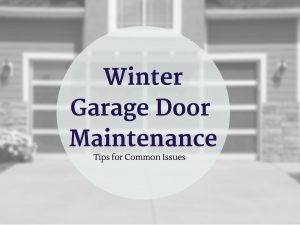
Your garage door is the largest moving part in your entire home, and is used multiple times per day at any hour and in all seasons. To keep your garage door operating smoothly for decades to come, it’s very important that you take the time to perform regular preventive care and maintenance. Winter conditions take the most significant toll to garage doors, so we have compiled 10 proactive tips to monitor tell-tale indicators of necessary maintenance and to prepare your garage door for harsh seasonal conditions.
1. Look and Listen
The most important preventive step you can take is to observe your garage door in action every time you use it. Is it moving smoothly or is it jerky in places? Does it operate silently or does it make grinding or scraping noises? Do both sides of the system (springs, pulleys and cables) look symmetrical?
2. Tighten up the Hardware
The average garage door moves up and down more than a thousand times a year. That’s a lot of movement and vibration, which can loosen the hardware. Examine and tighten all roller brackets and bolts with a socket wrench.
3. Test the Garage Door Balance
If your garage door is not properly balanced, the garage door opener will need to work harder, and it won’t last as long. After you disconnect the opener by pulling the release handle (usually a red cord), manually move the door about halfway up. If it doesn’t stay put, the counterweight system (springs) are improperly balanced. Garage door spring adjustment is best left to the professionals.
4. Inspect and Replace the Rollers
The rollers, whether steel or nylon, need to be inspected twice a year and replaced every seven years or so, and even more if you use your garage door many times a day. Worn, chipped or cracked rollers should be replaced as soon as possible. You do this by removing and reinstalling any roller brackets that are not directly attached to the cable system.
5. Replace the Weather stripping
If the rubber weather seal strip on the bottom of your door is brittle or cracked, replace it right away to keep the elements out of your house. There are many different styles of bottom rubber, depending on the manufacturer of the door. Call your local garage door professional to find the right type of rubber for your door.
6. Lubricate the Moving Parts
Keeping your garage door parts lubricated will add years of seamless operation to your system – and it takes just 10 minutes a year! Use a spray lubricant, available from your garage door specialist, to coat all of the moving parts, including the overhead springs.
7. Check the Cables
You should never tinker with the high-tension cables that lift your door because they have enough force to maim and kill. But you can check their condition so you know when to hire a pro. Check for broken strands and damage near the bottom roller bracket.
8. Test the Auto-Reverse Safety Features
There are two mechanisms: mechanical and photocell.
To test the mechanical feature: Place a piece of wood or a brick on the ground in the path of the door. When the door coming down touches that object, it should reverse direction and go back up again.
To test the photoelectric system with beams at each side: Close your door and just pass your leg in the door’s path. Your door should reverse.
If your opener is more than 20 years old, it may lack basic safety features – and so it’s time to buy a new garage door opener.
9. Clear the Tracks
Make sure the tracks on either side of the door are free from debris and, if you are so inclined, you can use a level to check the plumb. Any major adjustments to tracks must be done by a professional garage door technician.
10. Groom Your Garage Door
Don’t forget to examine the door itself. Wood doors will need to be checked for water damage and warp, as well as chipped and peeling paint. Steel doors may have rust spots that need to be sanded, primed and painted. Wash your garage door regularly with a mild all-purpose cleaner at the same time you do your car.

